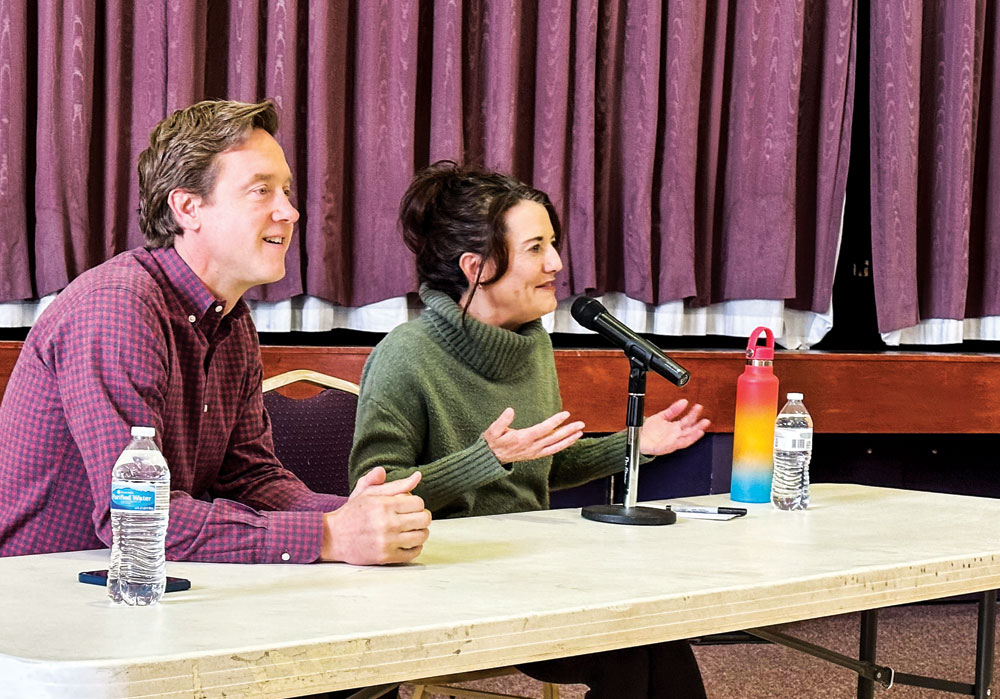
Following a debate by city council candidates at the New Hope Baptist Church in Northeast Denver on April 22, Mike Johnston and Kelly Brough engaged in a mayoral candidate debate. Each candidate was asked one question by each member of a Black leaders panel and had two minutes to elaborate on their platforms and ideas for leading Denver as the next city mayor. Front Porch photo by Christie Gosch
On April 4, Denver residents cast their votes in the contest for the mayor’s office and the races for the city council seats. The results of Election Day have determined the outright winners of some races, the remaining candidates in the runoff contests, and the voting patterns of the first round.

Kelly Brough, a mayoral runoff candidate, addresses the crowd at a campaign event at FlyteCo on April 15. Front Porch photo by Christie Gosch

Mike Johnston listens to an attendee at a mayoral runoff debate hosted by New Hope Baptist Church on April 22. Front Porch photo by Christie Gosch
Mayoral Results
The results in the mayoral race narrowed the field of 16 candidates down to the final two contenders. Mike Johnston finished in first place with 24.5 percent of the votes, Kelly Brough earned second place with 20 percent of the votes, and now Johnston and Brough are squaring off in a runoff election on June 6. With Johnston and Brough both representing the moderate wing of the mayoral field, voters demonstrated a preference for moderate candidates in the mayoral contest.
Money in Politics
In 2018, Denver passed the Fair Elections Fund to match small donations with tax-payer money. The public program intended to reduce the influence of wealthy donors on the elections and enable more grassroots candidates to run for office. This was the first cycle the Fair Elections Fund was utilized, and both winning candidates met the terms of the program. However, outside PACs and third-party groups wound up raising substantial funds to support their preferred candidates. As a result, Johnston and Brough each raised over a million dollars in campaign funds, independent PACs spent millions more, and the two top-funded candidates were able to get the most votes.
Voter Turnout
The turnout among Denver voters was lower than other recent elections. About 38 percent of active voters submitted ballots, and this is lower than statewide elections that happen in the fall and the last municipal election that occurred in 2019. Election experts speculate that the low turnout could be attributed to the timing of the springtime election, the large field of 16 mayoral candidates, or the likelihood of a runoff election. In a change from prior voting patterns, only 20 percent of ballots were cast with early voting, and an unusually high number of voters cast their ballots on Election Day.
Progressive Comebacks
At the end of Election Day, most progressive candidates for city council seats were losing in their respective races. But the same-day voters leaned heavily progressive, and over the next two days the counting of those later votes elevated several progressive candidates into leads, including in the Northeast districts. For District 9, incumbent Candi CdeBaca made a comeback to finish first and will now face challenger Darrell Watson in the runoff election. In District 8, Shontel Lewis came from behind to take the lead and will square up against Brad Revare in the runoff contest.
Outright Winners
City Council At-Large: Serena Gonzales-Gutierrez and Sarah Parady
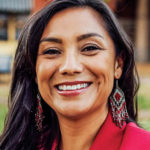
Serena Gonzales-
Gutierrez

Sarah Parady
Both at-large city council seats went to the candidates that were backed by progressive groups. Serena Gonzales-Gutierrez handily won the first at-large seat, but the second-place seat was very competitive. Though progressive-backed Sarah Parady was in fourth place on Election Day, in the following days the push among later voters lifted Parady up into the second place position and allowed her to secure the final at-large seat.
![]()
“I was clear with people about my values, what I see as the biggest challenges facing the city, and what I see as the solutions so people could be certain of what they were voting for,” says Parady. “I know what I’m being sent there to do, and I can’t tell you how seriously I take that concept of representing a city this big and complex, especially while we’re facing a lot of big existential issues.”
City Council District 5 (Mayfair, Montclair, and Lowry): Amanda Sawyer

Amanda Sawyer
In a two-person race, incumbent Amanda Sawyer received 65 percent of the vote in District 5 to earn a second term on the City Council. “It was really gratifying to see that two-thirds of the people who voted in District 5 are happy with the job that I’m doing,” says Sawyer. “It really gave me confidence moving forward to continue with those plans and to continue the work that we’re doing.”
![]()
Park Hill Golf Course: No on Question 2O
Denver decisively rejected the ballot measure for the Park Hill Golf Course. Westside Investment wanted voters to approve the ballot measure and lift the conservation easement so the company could develop the land and implement its project. But Question 2O was soundly defeated, as 60 percent of Denver voters chose to reject this development plan and retain the conservation easement. Westside says they have no intentions of attempting another ballot measure, and many residents want the City to purchase the land and convert it into a park.
Runoff Candidates
On June 6, voters in Denver will cast their final ballots to decide the winners of the runoff elections. All voters will help determine which mayoral candidate offers the best solutions to our problems, strategies for our city, and qualities as a leader. Northeast residents in districts 8 and 9 will also be able to cast votes in runoff elections for their city council seats. The ballots will be sent out on May 15, and the last day to vote by mail is May 30.
Front Porch spoke to the remaining candidates for the Denver mayoral election and the Northeast city council races. Each candidate was asked the same questions, and the following guide provides their perspectives on the issues facing our communities and the policies they would implement to overcome our challenges.
Since the order of the ballots has not yet been decided, Front Porch presented the candidates for each race in alphabetical order. The questions from the interviews are listed below, the responses from the candidates are provided in the story, and the contenders in the races were granted equal word counts.
Career Achievements: What are some of the proudest achievements during your professional career or public service?
Most Important Issue: What do you view as the single most detrimental problem facing Denver, and why do you rank it as the most significant issue?
Affordable Housing: What strategies do you think can most effectively increase the supply of affordable housing?
Homelessness: What is your position on the concept of encampment sweeps, and what are your plans to reduce the homeless population?
Crime Rates: What aspect of public safety do you view as the most prevalent problem, and what would be your solution to alleviate that issue?
Transportation: What changes to our transportation system can help mitigate traffic issues or improve road safety?
Final Remarks: Would you like to make a final remark about the election or a general statement to the voters?
City Council District 8: Central Park, Northeast Park Hill, and East Colfax
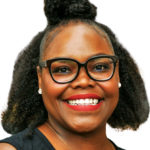
Shontel Lewis
Shontel Lewis
Career Achievements: I worked for Denver Public Schools by engaging with the community to help the district form plans for the schools. Then I was elected to the RTD Board and served as chair of the Performance Committee and Civil Rights Committee. I implemented strategic planning and measurable metrics to improve equity and access within the transportation system. I also passed free rides on Election Day, made committee meetings available for public comment, and completed a deal that enabled Montbello to use a closed Park-N-Ride lot to build affordable housing, retails stores, and a cultural center.
Most Important Issue: I hear most about long-term housing affordability from both a rental and homeownership standpoint. We need to give folks opportunities for home ownership, let folks who have been in their homes for 30 or 40 years keep their homes on fixed-incomes, and ensure that we’re also providing affordability for renters.
Affordable Housing: We can talk about tenant protections, partner with DPS to turn closed schools into workforce housing, and purchase motels to use for social housing. We should also use metrics and track the social determinants of health to understand why folks are unstable in their housing and connect them with services.
Homelessness: We shouldn’t sweep folks and their possessions. It’s ineffective, it’s inhumane, and it’s a bad use of our resources. But we should put those resources into a fund that purchases hotels, apartments, or existing affordable housing units to invest our dollars into keeping people housed and providing folks with services.
Crime Rates: We need to root our public safety in public health. We should give youth and adults access to resources, such as food banks, jobs opportunities, or summer reading programs. For police, we can expand the STAR program and prevent police from responding to situations that they’re not trained to handle.
Transportation: The city has to recommit to the Vision Zero policy and move with swift urgency to install life-saving traffic calming and infrastructure measures. We have to ensure bikers and pedestrians aren’t getting killed, invest in alternative and multi-modal transportation, and work across agencies at the municipal, state, and federal levels.
Final Remarks: I was a good mom at a young age, and that maternal instinct is how I approach my work in government. I love my constituents, I want to figure out their needs so I can actualize them in the community, and the world needs that maternal support, tenderness, and accountability.

Brad Revare
Brad Revare
Career Achievements: I volunteered for a state senator in his community office in Northeast Denver. I ran his citizen policy committee, helped him get feedback from the people he represented, and organized ideas that he could introduce at the Capitol. I then served as a volunteer for Central Park United Neighbors (CPUN) and the East Colfax Steering Committee. I worked to make our neighborhoods safer for walkers or drivers, learned about innovative models for affordable housing, got the citizens involved with community issues, and started a youth apprenticeship program to provide young people with career opportunities.
Most Important Issue: Making Denver more affordable is the number one issue. You shouldn’t need to be a millionaire to live in Denver, but it seems like that is what’s happening. Whether it’s housing, transportation or energy bills, a lot of people are grappling with the rising costs of living here in Denver.
Affordable Housing: We need to find ways to use city dollars and land trusts to buy existing housing or lots and make permanently affordable housing. We should also have the community at the decision-making table to decide which amenities, assets, and levels of affordability they would like to see with the housing.
Homelessness: People experiencing homelessness want supportive housing units and ways to get off the street. We need to build enough housing and provide compassionate services so people don’t need to have encampments out there because that isn’t good for the people living on the streets, the surrounding neighborhoods, or small businesses.
Crime Rates: We need to define the police so they’re well-trained, they’re held accountable, and they have the resources they need to responsibly fight crime. Then we need to continue growing our alternate response units to help people in crisis and make sure the right professionals are responding to the right situations.
Transportation: The single biggest improvement we need is making our intersections safer on busy roads. What I hear the most from voters is that illegal speeding and unsafe intersections are the two biggest concerns around transportation.
Final Remarks: The reason why I’m running is just that I’m committed to bringing equitable city resources to all neighborhoods in District 8. It’s so important that Northeast Denver reaches its potential and that everybody can thrive in our community.
City Council District 9: South and North Park Hill, North Denver, and Five Points

Candi CdeBaca
Candi CdeBaca (Incumbent)
Career Achievements: As an activist, I prevented DPS from closing Manual by organizing the community and suing the district. I also channeled the outrage from that experience to start Project Voyce, a nonprofit that equips young people with tools to craft policies. I then worked in DC for six years while developing federal policies, and after returning to Denver I was elected to the City Council. I passed policies that divested the city from private prisons, gave right to counsel for evicted tenants, added wage theft penalties for abusive employers, and referred the Park Hill Golf Course to the ballot for voters.
Most Important Issue: Housing and cost of living are crucial because they are the foundation of stability, not just on a micro level, but in our economy. To not have that stability on an individual level or macro scale creates a volatile situation regarding revenues, spending, and the whole functioning of our city.
Affordable Housing: We need to invest more in affordability. About two percent of our city budget goes toward affordable housing, and it’s mostly going towards higher brackets of affordability. We need to devote more of our budget to our top issue, demand more of developers, and mandate the deepest levels of affordability.
Homelessness: The sweeps are more about government waste than anything else. The only solution to homelessness is housing. The sweeps are expensive, we’re doing them almost on a daily basis, and so we could be using those dollars to put people under physical roofs instead of sweeping them around the city.
Crime Rates: We’ve criminalized poverty. When you have desperate people with nothing to lose, you have a situation that fosters crime. Getting tough on crime hasn’t worked. We need to get smart on crime regarding what we call crimes, how we can intervene before crimes occur, and in many cases it’s poverty.
Transportation: We need to de-politicize our agencies. DOTI didn’t focus on transportation infrastructure, we gave Uber our last-mile transit, and we’re having developers build the infrastructure. That’s entirely backwards. We need to reform how we issue transportation bonds, do better at supplementing RTD services, and improve our leadership on infrastructure improvements.
Final Remarks: The voters of District 9 represent the core of Denver that are most impacted by good and bad legislators on Council. Our voters cannot be bought by fundraising or lied to by mailers because they recognize that this is a critical election and they know how to find accurate information.
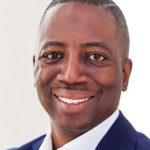
Darrell Watson
Darrell Watson
Career Achievements: I’m proud that my consulting firm provides strategic leadership and diversity training for organizations in the private, public, and non-profit sectors. We consulted the Urban Land Conservancy in their project to purchase the Johnson & Wales campus, convert the dorm rooms into affordable housing units, and preserve the open space for the community. I also served as Chair of the Housing Stability Strategic Advisors. I listened to experts on affordable housing, spoke to the community about the policy impacts, and helped form the inclusionary housing program that was passed by the Council and that increased affordable housing for working families.
Most Important Problem: Mine is definitely housing because of the crisis we’re experiencing. We’re a collection of neighborhoods, and if a city can’t preserve neighborhoods and maintain places for families to live, that city is no more and we’ll fall into disrepair. So it’s essential we provide policies that tackle our housing crisis.
Affordability: We have to prioritize funding for rental assistance for folks dealing with increases that are not sustainable based on jobs in the working class. Then we can incentivize development by getting the permitting process done more quickly and by reducing the permitting turnaround time from 18 months to three months.
Homelessness: Having folks dying in unsanctioned campsites is not acceptable. Sweeps are moving folks around, so it’s not cost-effective and it doesn’t change the lives of folks in unsanctioned campsites. I will focus on having transitional housing, tiny homes and motel purchases, and do it regionally by partnering with other cities.
Crime Rates: It’s important to fully fund the police and hire the officers that we’ve been short of in the police and sheriff’s departments. We also need to hire folks for those police departments from within the community’s high schools or junior colleges because outcomes are better when they know the community.
Transportation: Vision Zero is a great idea, and now we need to work on implementing it. We need to build or maintain our streets with the focus of safety, have certain requirements that are not negotiable to community input, and have experts focus on safety with traffic calming or bike lanes.
Final Remarks: This election is extremely important. Folks you elect for mayor and city council are gonna create the direction of Denver and the policies that impact our lives for the next decade. Voters should take it seriously, and I’ve demonstrated an ability to work collaboratively with the community and elected officials.
Denver Mayoral Candidates
Kelly Brough
Career Achievements: As Chief of Staff for Mayor Hickenlooper, I implemented the 311 system that enables citizens to connect with government services, and I organized the Democratic National Convention that showcased Denver in an amazing way. During the recession, I built a balanced budget with lower revenue, negotiated contracts with city unions, and modernized the HR system for Career Services. Then as CEO of the Denver Metro Chamber of Commerce, I oversaw the economic development in the city, created jobs above the median wage, and implemented the Denver Prosperity Fund to help public school graduates go to college and get good jobs.
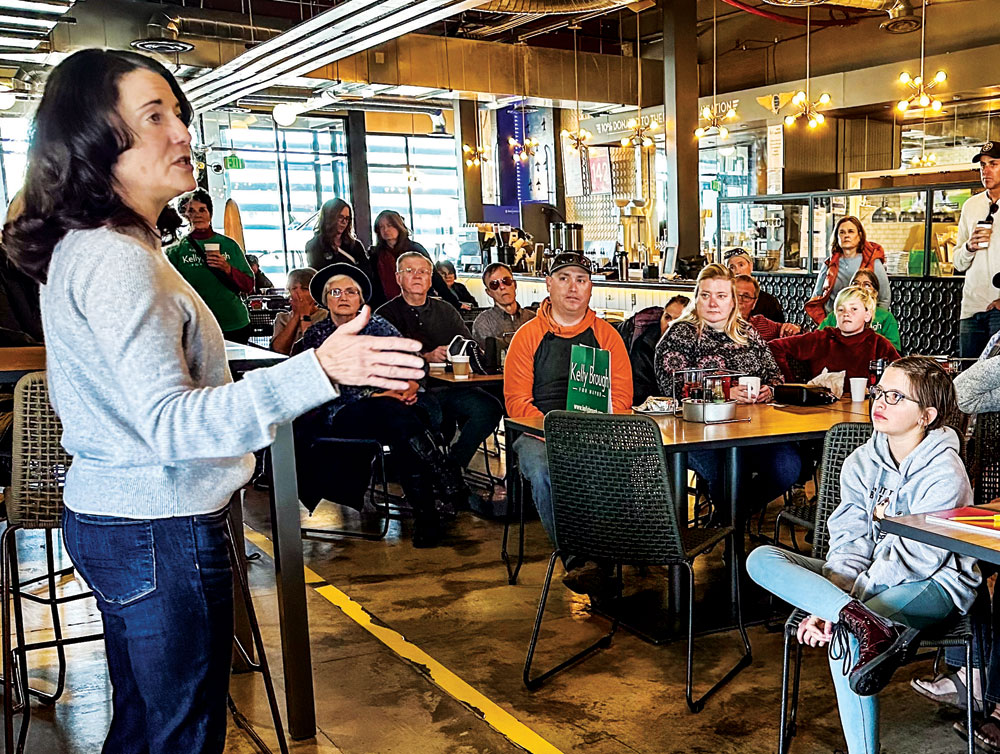
At a Coffee with Kelly event, mayoral candidate Kelly Brough took questions from participants, including 5th grader Sylvia Plavnick (right) who is running for Ameritowne Mayor of her school class. Front Porch photo by Christie Gosch
Most Important Issue: The greatest challenge we face is people who are unhoused. Last year 173 people died because they’re unhoused, and it’s the number one issue I hear about from residents. So it’s a crisis, I know we can do better, and we must do something different than what we’re doing today.
Affordable Housing: I’d speed up the city’s permitting process by creating one department with all the permitting, development, and inspection teams working together with one manager. We can lower rent with a master leasing program where the mayor leases units to give landlords a guaranteed payment and prevent increases for a period of time. For ownership, I would look at publicly owned surface lots and form partnerships to build for sale housing products that families can afford.
Homelessness: I would end unsanctioned camping by providing safe and sanctioned outdoor locations with running water, bathrooms, trash receptacles, and support services. Then I would work on prevention because it’s more expensive to help someone deal with the trauma of being unhoused than to keep people housed in the first place.
Crime Rates: Sending the right responders improves outcomes where we need mental health professionals and frees up officers for other critical issues. I would also recruit more officers, provide the support they need to be proactive on crime, and reduce the drivers of crime by focusing on recreational programs and economic opportunities.
Transportation: We’re doing a terrible job of the Vision Zero goal to kill zero cyclists or pedestrians. We need to build more densely where we’ve invested in public transit locations to get people out of their cars. We also need to slow cars down, expand bike lanes, and use better technology.
Final Remarks: My lived experience lets me understand the challenges of Denver residents, my professional experience allowed me to work extensively in the city, and on day one I can address the critical issues we face. I’ve never run for office before, and I’m not gonna run again. So I will never worry about saving my political capital, and every decision I make will be about helping the residents of this city and making their lives better.
Mike Johnston
Career Achievements: When I was a principal, I turned a Thornton high school around by having 100 percent of our seniors graduate, and then Obama selecting me as his education advisor allowed me to travel the country and prepare for debates during his 2008 campaign. In the state Senate, I passed the ASSET bill for undocumented students, a gun safety policy for background checks, and a renewable energy goal for climate change. As CEO of the philanthropic Gary Community Ventures, I created our universal preschool program, led Proposition 123 on affordable housing, and handled the pandemic response by providing a vaccination program.
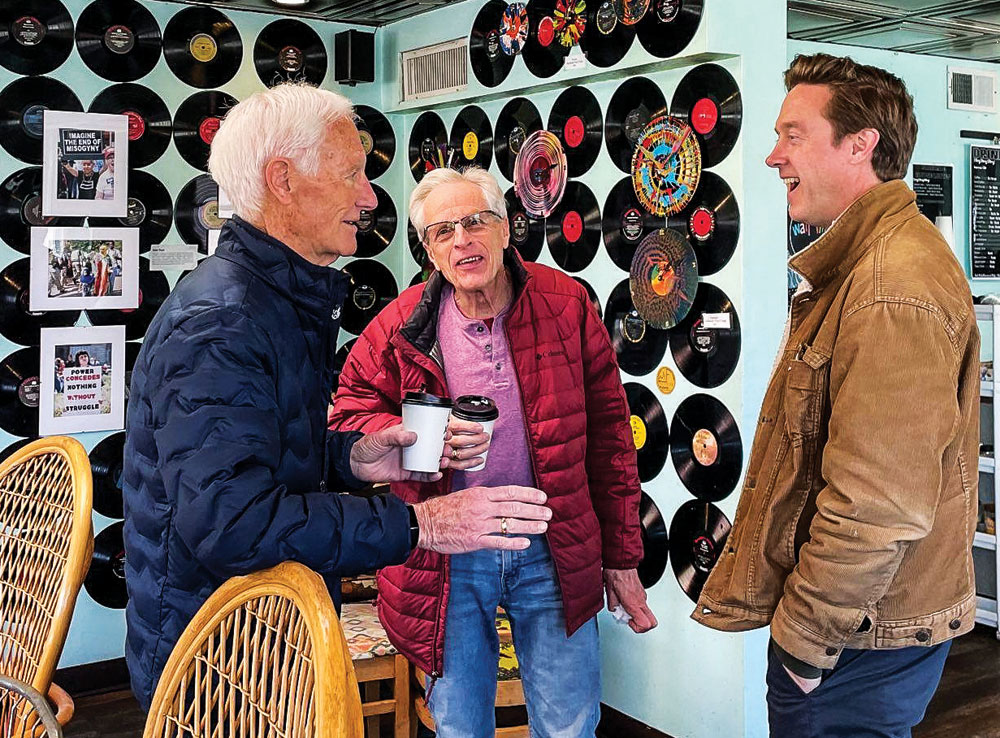
Mayoral runoff candidate Mike Johnston takes questions from Frank and Jerry Gold about his housing and homeless policies during Johnston’s tour of all 78 Denver neighborhoods before the April 4th election. Photo courtesy of Mike Johnston for Mayor campaign
Most Important Issue: The number one issue is the crisis around homelessness. That’s an indicator of our failure to serve those folks who have significant needs, it also continues to be a real crisis for neighborhoods, and so we want to get them access to housing and keep our streets available for everyone.
Affordable Housing: I got the chance to work on this and help pass Proposition 123 to provide $300 million a year for affordable housing. I would use those resources to build 25,000 units of permanently affordable housing. Anybody who makes $100,000 or less would be eligible to live in one of these units, you would never pay more than 30 percent of your income on rent, and the rent can’t go up unless your income goes up.
Homelessness: When you sweep people there’s no place for them to go. That’s why I proposed an evidence-based plan for micro communities and tiny homes to give folks the access to the housing they need. We can provide the communities with wraparound services, mental health support, addiction treatment, and workforce training.
Crime Rates: We have a shortage in police officers and so we need 200 more first responders. We also want community-based policing with officers walking neighborhoods, talking to residents, and building relationships. I also want to convert pods in the county jail for a mental health facility and an addiction-based treatment center.
Transportation: We need to increase public transit by developing more housing located next to transit, ensuring buses are convenient to access, and making light rails free for commuters. We can also create more dedicated bike lanes so people can ride bikes to get around the city and go to different places.
Final Remarks: I have a big vision for what the city can become and a sense of hope and optimism for what’s possible in Denver. I know these problems are solvable, and I’ve spent my career solving hard problems, such as immigration reform, gun safety, or universal preschool. I’ve built coalitions with diverse groups to deliver historic results, I know we can do that in Denver now, and that’s why I’m so excited about the path ahead.




0 Comments